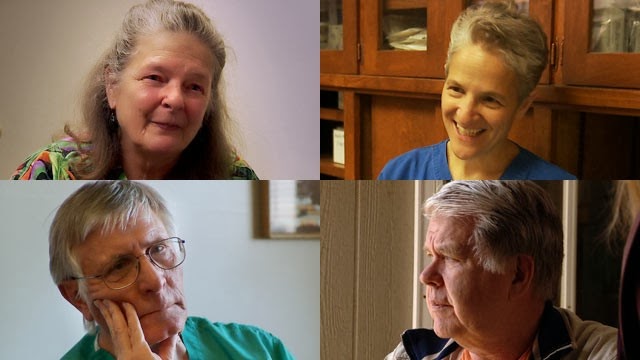Written by Max Thornton.
One of the first classes of my master’s degree was called “Religion and Politics in the US,” and one of the assigned texts was Ziad W. Munson’s The Making of Pro-Life Activists: How Social Movement Mobilization Works. Rather to my surprise, I learned that anti-choice activism does not on the whole result from strong anti-choice convictions: in fact, movement involvement often precedes the formation of convictions. People come into contact with the movement at times of major life transition – through new friends at college, say – and begin their activism for primarily social reasons. Beliefs come later. This is not only a good poststructuralist account of subjectivity (holla at Foucault and my homegirl Judith Butler), but it’s also a useful lesson to those of us on the other side. Though our adversaries might be impermeable to facts and logic, this thing isn’t unwinnable. We just have to use the right strategies to get through to people. If After Tiller can’t change the minds of anti-choice die-hards (and maybe it can! I haven’t asked any!), then it might at least be a mobilization tool for our side to recruit activists from among the undecided.
I’m not kidding. I genuinely think After Tiller is the most important film that will be released this year.
 |
| Reproductive Justice League! |
Directors Martha Shane and Lana Wilson portray the daily lives of four late-term abortion providers, LeRoy Carhart, Warren Hern, Susan Robinson, and Shelley Sella. They chose these doctors because they are the only providers of third-trimester abortions left in the United States. All four were friends and colleagues of Dr. Tiller, and all four clearly derive at least some of their professional motivation from the desire to pay appropriate tribute to the memory of his sacrifice. This is not a film about the anti-choice movement. As the directors state in their press notes:
We decided to represent the anti-abortion movement as it is experienced by the doctors themselves – as a constant presence in the background, whether standing outside their clinics in protest, or lurking in the air as a potential threat – but not as the main story.
This is a film about the individual human beings, the everyday heroes, who provide this essential service, and the daily workings of their clinics. It is their story, a project in which they chose to participate in order to be humanized in the eyes of those who would vilify them as “baby-killers.” I hope some anti-choice hardliners will see the film, because they surely couldn’t ignore the truth about these four doctors:
-
How good they are, providing a desperately needed service, and treating their patients with oceans of compassion.
-
How human they are, getting up daily and keeping at their work despite the dangers and psychological toll of the constant threat from anti-choice terrorists, and relying on the love and support of their families to keep them going.
-
How moral they are, clearly thinking about the issue deeply every day of their lives, and fully aware of the moral burden of being the last resort for pregnant people who don’t want to be pregnant. Even an unyielding anti-choicer would have to admit that these doctors are far from cheery baby-murderers. They all have backgrounds in midwifery or obstetrics. They like babies! They want babies to live and be loved and have wonderful lives! That’s why they provide this service, to spare the babies who wouldn’t live and be loved and have wonderful lives.
-
How feminist they are, living out their commitment to women’s rights, and trusting pregnant people’s personal moral reasoning. One doctor speaks very movingly of her absolute refusal to morally infantilize pregnant people, of her unwavering faith that anyone seeking a third-trimester abortion will have been through all the ethical legwork necessary to make such a heart-aching decision.
And make no mistake, this film is also the story of the patients. It’s gut-wrenching to hear the testimony of the parents-to-be whose desperately wanted baby is so ridden with fetal abnormalities as to be unviable; of the rape survivor who spent the early months of the pregnancy in traumatized denial; of the sixteen-year-old Catholic who doesn’t think she will ever forgive herself, but feels abortion is the least worst option for her at this time. All the patients have given this decision immense amounts of thought, and they all urgently need this service.
Worryingly, it’s not clear how much longer late-term abortions will be available in the US (and the filmmakers do not omit the fact that medical costs alone are far beyond the means of most people, let alone the price of traveling to either Albuquerque, Boulder, or Germantown, MD). None of these doctors are getting any younger, and there isn’t exactly a clamor to replace them. This is by far the most troubling aspect of the film. All of the doctors speak of formative experiences seeing the terrible impacts of criminalized abortion on both women (who suffer tremendously from DIY abortion attempts) and children (who, unwanted, are sometimes horrendously neglected and abused). Those of us who have only lived in a post-Roe world have not seen this firsthand; we don’t know that world and we don’t have that drive.
This film is a remarkable spur to much-needed action. I feel compelled to speak out to from my own context of mainline Christianity, which is too often evasively silent on the topic of reproductive justice. George Tiller, murdered on a Sunday as he served at his beloved Lutheran church, did not worship the forced-birther God of the anti-choicers, and neither do I.
 |
| Go Team Leftist Christians for reproductive justice! |
Max Thornton blogs at Gay Christian Geek, tumbles as trans substantial, and is slowly learning to twitter at @RainicornMax. In case you couldn’t tell, he’s strongly pro-choice.

OOOOOOOOHHHHH, IT LOOKS SO INTERESTING. Do you think there would be any way of seeing it or acquiring a copy of it, here in Latin America?
btw… I love reading you.